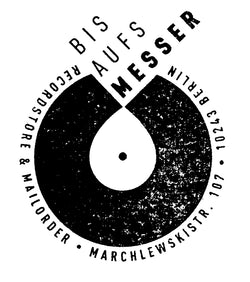TILT from their 1980 recording session, is a milestone whose significance due to the lack of an official release has never been sufficiently understood and appreciated. This is the very beginning of the band’s studio experiences, a band who a few years later became one of the most known of the Polish domestic music scene.
TILT, along with DEADLOCK and KRYZYS, were one of the key musical formations in the first wave of punk scene in Poland. They were a part of a cultural subversion. They created a space filled with a community which could boldly express itself and propose its own artistic forms regardless of external and internal limitations. Creativity and having a means of self expression allowed people to escape the expectations and control of a gloomy political regime. The formation of subsequent music groups, the first Polish-language zines, leaflets, graphics, collages, performances and other forms of artistic expression, all formed an undeniable movement, which at the turn of the decade between the 1970s and 1980s, initiated the culture of what is referred to as third circuit – underground network for the distribution of information while the second circulation had consisted of political opposition to the communist party.
The first stage in the history of the band TILT happened in the period between 1979-1980. Initially, the band was formed by Tomek Lipiński, Tomek Szczeciński and Jacek Lenartowicz. Jacek had previously played in the legendary DEADLOCK from Gdańsk. Before end of this chapter of history of the band, Pyza joined them and she was playing the keyboards.
From the very beginning, the band had a broad artistic vision, and their work was supported and promoted by significant representatives of the Polish avant-garde and modern art scenes, such as Andrzej Zuzak (theatre, situationism, Agencja Sztuki Alternatywnej), Piotr Rypson ("Post" fanzine, art historian, curator) and Henryk Gajewski (Galeria Post Remont, independent cassette label, "Post" fanzine). After the group disbanded, Tomek Lipiński and Tomek Szczeciński co-founded and were involved the supergroup BRYGADA KRYZYS with members of KRYZYS. Luter and Pyza were active in the dada-postpunk band BIAŁE WULKANY. TILT, on the other hand, would return with a new line-up in 1983 and would continue to function, with longer and shorter breaks from time to time, for the next several decades.
The album "On the Border line” which we are presenting here, contains four songs whose sound was influenced by the transformation occurring amidst the first wave of punk rock into what became known as "post-punk." The songs were recorded during a two-hour session at Studio S1 of Polish Radio during the first months of 1980. Additionally, the album includes an acoustic version of the song "Photo is photo” which was recorded on a four-track at Tomek Lipiński's house. Songs from these sessions appeared in classic Henryk Gajewski's films, "Tilt Back” and “Passenger”.
The studio session from the Polish Radio recording was never released on vinyl, but these four songs did appear on one of the very the first release containing punk music that was ever released in Poland: the cassette compilation "First Polish New Wave". The whole first side of that cassette was filled with TILT recordings, both studio and live, songs which were recorded during the 1st New Wave Festival in Kołobrzeg (the second side was filled with other bands who had performed there - Deadlock, Kryzys, KSU, Poerocks and Kanał).
Music presented on this record have finally a chance to sound the way they were supposed to, in their full splendor (and on the most noble format). Reconstructed and mastered by Studio As One. Four decades later, this important piece in the history of music in Poland will undoubtedly be rediscovered by some and heard by many for the first time. This record represents an absolute pearl from the times when punk/wave music was first forming in Poland just before political turbulence and military junta of 1981.

